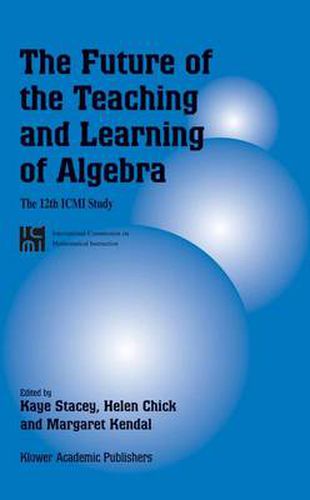Readings Newsletter
Become a Readings Member to make your shopping experience even easier.
Sign in or sign up for free!
You’re not far away from qualifying for FREE standard shipping within Australia
You’ve qualified for FREE standard shipping within Australia
The cart is loading…






This title is printed to order. This book may have been self-published. If so, we cannot guarantee the quality of the content. In the main most books will have gone through the editing process however some may not. We therefore suggest that you be aware of this before ordering this book. If in doubt check either the author or publisher’s details as we are unable to accept any returns unless they are faulty. Please contact us if you have any questions.
Kaye Stacey’ Helen Chick’ and Margaret Kendal The University of Melbourne’ Australia Abstract: This section reports on the organisation’ procedures’ and publications of the ICMI Study’ The Future of the Teaching and Learning of Algebra. Key words: Study Conference’ organisation’ procedures’ publications The International Commission on Mathematical Instruction (ICMI) has’ since the 1980s’ conducted a series of studies into topics of particular significance to the theory and practice of contemporary mathematics education. Each ICMI Study involves an international seminar’ the Study Conference ‘ and culminates in a published volume intended to promote and assist discussion and action at the international’ national’ regional’ and institutional levels. The ICMI Study running from 2000 to 2004 was on The Future of the Teaching and Learning of Algebra’ and its Study Conference was held at The University of Melbourne’ Australia fromDecember to 2001. It was the first study held in the Southern Hemisphere. There are several reasons why the future of the teaching and learning of algebra was a timely focus at the beginning of the twenty first century. The strong research base developed over recent decades enabled us to take stock of what has been achieved and also to look forward to what should be done and what might be achieved in the future. In addition’ trends evident over recent years have intensified. Those particularly affecting school mathematics are the massification of education-continuing in some countries whilst beginning in others-and the advance of technology.
$9.00 standard shipping within Australia
FREE standard shipping within Australia for orders over $100.00
Express & International shipping calculated at checkout
This title is printed to order. This book may have been self-published. If so, we cannot guarantee the quality of the content. In the main most books will have gone through the editing process however some may not. We therefore suggest that you be aware of this before ordering this book. If in doubt check either the author or publisher’s details as we are unable to accept any returns unless they are faulty. Please contact us if you have any questions.
Kaye Stacey’ Helen Chick’ and Margaret Kendal The University of Melbourne’ Australia Abstract: This section reports on the organisation’ procedures’ and publications of the ICMI Study’ The Future of the Teaching and Learning of Algebra. Key words: Study Conference’ organisation’ procedures’ publications The International Commission on Mathematical Instruction (ICMI) has’ since the 1980s’ conducted a series of studies into topics of particular significance to the theory and practice of contemporary mathematics education. Each ICMI Study involves an international seminar’ the Study Conference ‘ and culminates in a published volume intended to promote and assist discussion and action at the international’ national’ regional’ and institutional levels. The ICMI Study running from 2000 to 2004 was on The Future of the Teaching and Learning of Algebra’ and its Study Conference was held at The University of Melbourne’ Australia fromDecember to 2001. It was the first study held in the Southern Hemisphere. There are several reasons why the future of the teaching and learning of algebra was a timely focus at the beginning of the twenty first century. The strong research base developed over recent decades enabled us to take stock of what has been achieved and also to look forward to what should be done and what might be achieved in the future. In addition’ trends evident over recent years have intensified. Those particularly affecting school mathematics are the massification of education-continuing in some countries whilst beginning in others-and the advance of technology.